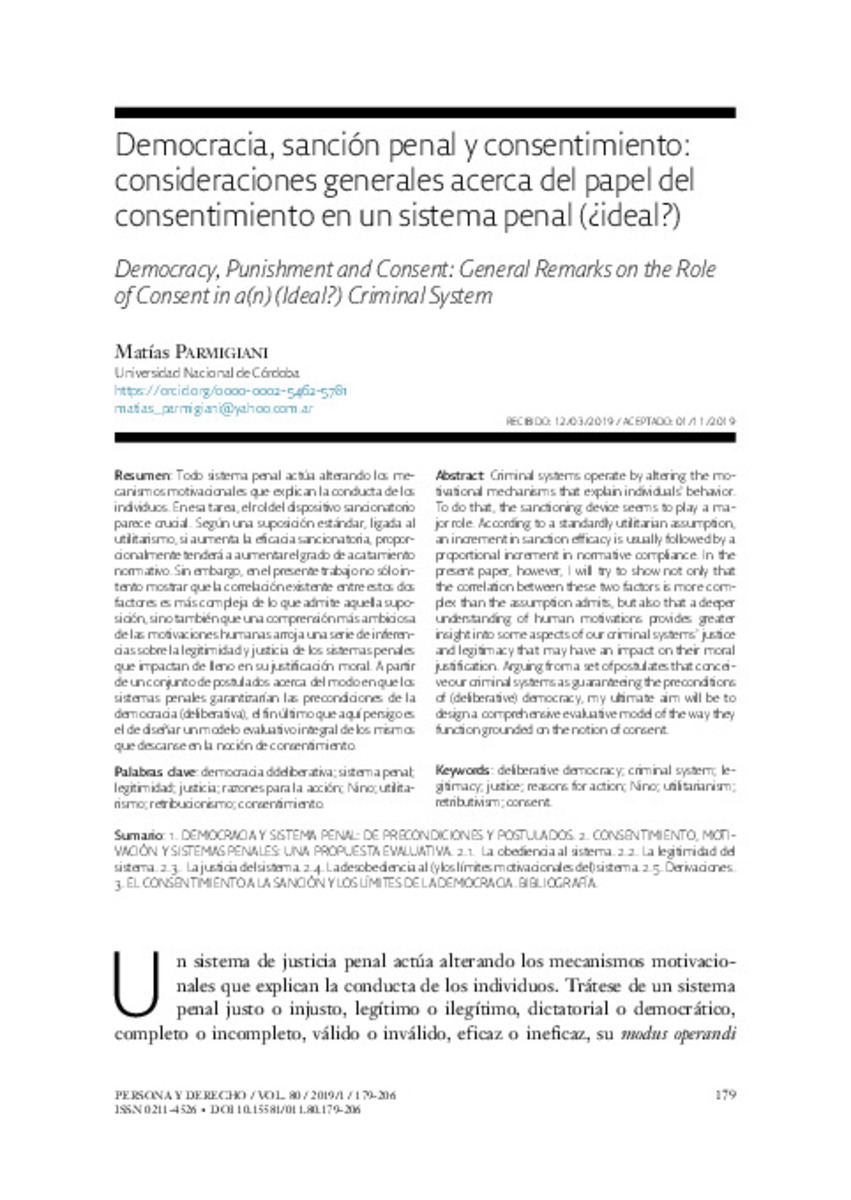Full metadata record
| DC Field | Value | Language |
|---|---|---|
| dc.creator | Parmigiani, M. (Matías) | - |
| dc.date.accessioned | 2019-11-01 | - |
| dc.date.accessioned | 2021-05-17T11:38:44Z | - |
| dc.date.available | 2021-05-17T11:38:44Z | - |
| dc.date.issued | 2019 | - |
| dc.identifier.citation | Parmigiani, M. (Matías). "Democracia, sanción penal y consentimiento: consideraciones generales acerca del papel del consentimiento en un sistema penal (¿ideal?)". Revista Persona y Derecho. (80), 2019, 179 - 206 | es |
| dc.identifier.issn | 0211-4526 | - |
| dc.identifier.uri | https://hdl.handle.net/10171/60486 | - |
| dc.description.abstract | Criminal systems operate by altering the motivational mechanisms that explain individuals’ behavior. To do that, the sanctioning device seems to play a major role. According to a standardly utilitarian assumption, an increment in sanction efficacy is usually followed by a proportional increment in normative compliance. In the present paper, however, I will try to show not only that the correlation between these two factors is more complex than the assumption admits, but also that a deeper understanding of human motivations provides greater insight into some aspects of our criminal systems’ justice and legitimacy that may have an impact on their moral justification. Arguing from a set of postulates that conceive our criminal systems as guaranteeing the preconditions of (deliberative) democracy, my ultimate aim will be to design a comprehensive evaluative model of the way they function grounded on the notion of consent. | en_US |
| dc.description.abstract | Todo sistema penal actúa alterando los mecanismos motivacionales que explican la conducta de los individuos. En esa tarea, el rol del dispositivo sancionatorio parece crucial. Según una suposición estándar, ligada al utilitarismo, si aumenta la eficacia sancionatoria, proporcionalmente tenderá a aumentar el grado de acatamiento normativo. Sin embargo, en el presente trabajo no sólo intento mostrar que la correlación existente entre estos dos factores es más compleja de lo que admite aquella suposición, sino también que una comprensión más ambiciosa de las motivaciones humanas arroja una serie de inferencias sobre la legitimidad y justicia de los sistemas penales que impactan de lleno en su justificación moral. A partir de un conjunto de postulados acerca del modo en que los sistemas penales garantizarían las precondiciones de la democracia (deliberativa), el fin último que aquí persigo es el de diseñar un modelo evaluativo integral de los mismos que descanse en la noción de consentimiento. | es_ES |
| dc.language.iso | spa | - |
| dc.publisher | Servicio de Publicaciones de la Universidad de Navarra | es_ES |
| dc.rights | info:eu-repo/semantics/openAccess | es_ES |
| dc.subject | democracia deliberativa | - |
| dc.subject | sistema penal | - |
| dc.subject | legitimidad | - |
| dc.subject | justicia | - |
| dc.subject | razones para la acción | - |
| dc.subject | Nino | - |
| dc.subject | utilitarismo | - |
| dc.subject | retribucionismo | - |
| dc.subject | consentimiento | - |
| dc.title | Democracia, sanción penal y consentimiento: consideraciones generales acerca del papel del consentimiento en un sistema penal (¿ideal?) | es_ES |
| dc.title.alternative | Democracy, Punishment and Consent: General Remarks on the Role of Consent in a(n) (Ideal?) Criminal System | en_US |
| dc.type | info:eu-repo/semantics/article | es_ES |
| dc.identifier.doi | 10.15581/011.80.179-206 | - |
| dadun.citation.endingPage | 206 | - |
| dadun.citation.number | 80 | - |
| dadun.citation.publicationName | Revista Persona y Derecho | - |
| dadun.citation.startingPage | 179 | - |
Files in This Item:
Statistics and impact
Items in Dadun are protected by copyright, with all rights reserved, unless otherwise indicated.






